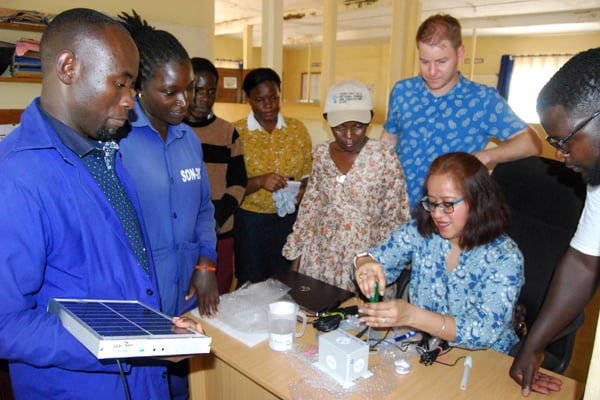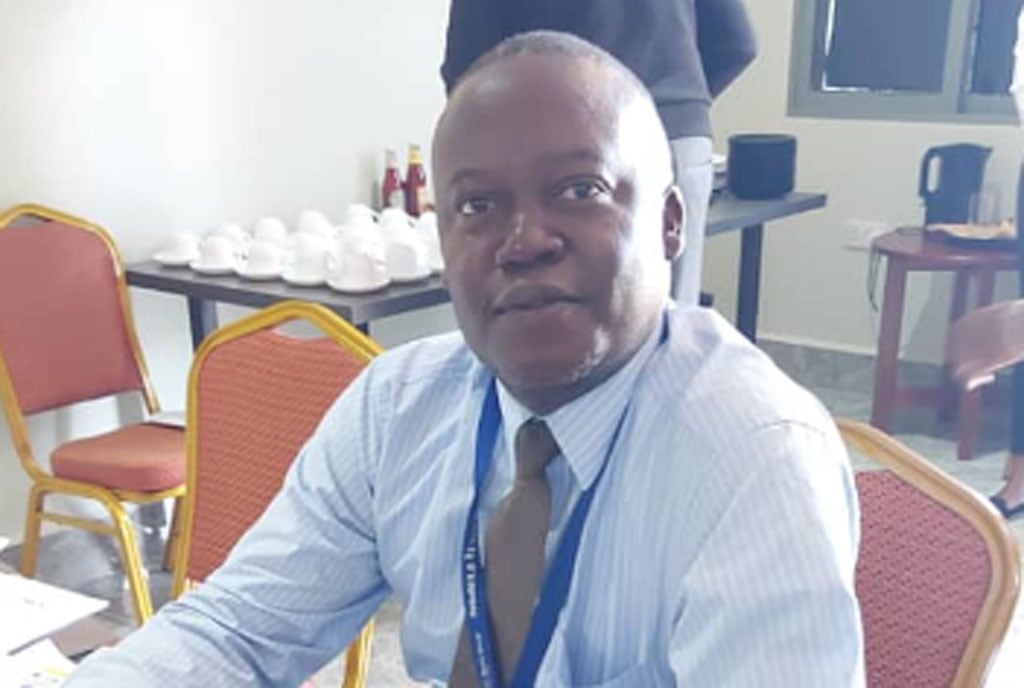Prime
UK firm, Makerere in joint drive to save Ugandan fish ponds, cages

Ms Rinku Dasbiswas, the founder of UK-based Aqsen Innovations Ltd (seated) demonstrates how Aquasense, a real time water monitoring solution, works at Source of the Nile (SoN) fish farm, Bugungu in Buikwe District on January 31,2023. PHOTO/PHILIP WAFULA
What you need to know:
- The first demo trial installation of Aquasense was on Tuesday commissioned at the Source of Nile (SON) fish farm in Bugungu, Buikwe District by Ms Dasbiswas, who was flanked by South African-born commercial co-founder, Mr Matthew Fisher.
A United Kingdom-based registered tech startup has partnered with Makerere University College of Natural Sciences to save fish in Ugandan ponds and cages.
This is after a World Fisheries Report (2022) revealed that big and medium inland fish farms across the world lose up to 3.2 million tonnes of yield per year ($9.6billion) to fish kills, yet more often than not, this is due to issues with water quality.
Subsequently, Ms Rinku Dasbiswas, the founder of Aqsen Innovations Ltd, has over the past few years been collaborating with leading aquaculture farms and government bodies to implement Aquasense, a real time water monitoring solution.
The first demo trial installation of Aquasense was on Tuesday commissioned at the Source of Nile (SON) fish farm in Bugungu, Buikwe District by Ms Dasbiswas, who was flanked by South African-born commercial co-founder, Mr Matthew Fisher.
“This trip shows our commitment to the aquaculture sector in Uganda in addressing the challenges faced with the real time monitoring of critical water quality parameters,” Ms Dasbiswas said in an interview with Monitor.
She added: “We are here to install a system that will gather data over the coming months which we will correlate with actionable insights for informed decision making.”
Mr Fisher and Ms Dasbiswas met last October in London through Zinc.vc, with a common purpose to better the environmental crisis facing the planet by building a venture together.
“I hope to strengthen the excellent relationships in place, and use this trial to leverage our commercial footprint across the region with an affordable subscription model,” Mr Fisher said.
Dr Rosemary Nalwanga, a researcher from Makerere University College of Natural Sciences, said traditionally, one has to move into a pond or cage and insert probes and user values that would mean one feeds fish without having prior knowledge of temperature, oxygen and other water quality parameters.
“However, with this new technology of Aquasense, one can get to know what’s happening in a pond, cage or any aquatic system wherever they are,” Dr Nalwanga said.
She added that in terms of feeding, she will also be able to tell what she should feed and that way there will be maximisation of feeds which depends entirely on water quality.
“Feed is the most expensive consumable in the aquaculture process and is entirely dependent on water quality parameters like temperature, oxygen ammonia and pH. Water pollution caused by excess feed is much more manageable with real time water quality monitoring,” Dr Nalwanga explained.
Prof Fredrick Jones Muyodi, a lecturer at Makerere University College of Natural Sciences, said this innovation is important and significant for the development and sustainability of the aquaculture sector.
Mr John Bolingo, the lake operations supervisor at SoN fish farm, said they have tested the gadget and the biggest advantage is getting real time reporting of water quality parameters which will be a very good monitoring tool for other fish farmers.
“We are championing this as SoN fish farm; this technology is very beneficial to every fish farmer and we should all look up to this.
“We shall try to monitor when disease can attack, when we can change the water in the ponds and when we are supposed to clean our nets based on the water quality readings that will be reported in real time,” Mr Bolingo said.
Dr Winnie Nkalubo, the director of National Fisheries Resources Research Institute
NaFIRRI described the installation of the innovation as ‘a big milestone for everyone involved’.
“It will help educate farms for wider adoption of real time monitoring systems for sustainable aquaculture,” she said.



